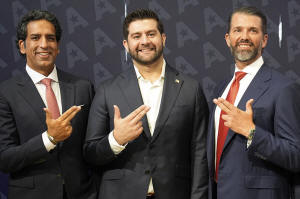For Sale: Trump is leveraging power of his office to reap profits for
family businesses
[July 19, 2025] By
BRIAN SLODYSKO and WILL WEISSERT
WASHINGTON (AP) — If one theme has emerged in President Donald Trump’s
second term, it's this: He's leveraged the power of his office for
personal gain unlike anyone before in history.
From crypto coins to bibles, overseas development deals to an upcoming
line of cellphones, Trump family businesses have raked in hundreds of
millions of dollars since his election, an unprecedented flood of often
shadowy money from billionaires, foreign governments and cryptocurrency
tycoons with interests before the federal government.
“He is president and is supposed to be working in the public’s
interest,” said James Thurber, an emeritus professor at American
University, who has researched lobbying, campaign finance and political
corruption for decades. “Instead, he is helping his own personal
interest to grow his wealth. It’s totally not normal.”
The sums amassed by the Trump Organization, the collection of companies
controlled by the president’s children, are far greater than those
collected by the family during the president’s first term, when
patronage of his hotels, resorts and golf courses was de rigueur to
curry favor with the famously transactional commander-in-chief.
The second time around, the Trump family’s ambitions are far grander,
stretching from cyberspace to far-flung regions across the globe. One of
Trump’s cryptocurrencies is conservatively estimated to have pulled in
at least $320 million since January, while another received a $2 billion
investment from a foreign government wealth fund. A third has sold at
least $550 million in tokens.
His sons have jetted across the Middle East to line up new development
deals, while his daughter and son-in-law are working with the Albanian
government to build a Mediterranean island resort. Even first lady
Melania Trump has inked a $40 million documentary deal with Amazon,
whose founder, Jeff Bezos, was a frequent target of Trump during his
first presidency and whose companies contract extensively with the
federal government.

Drain the swamp?
The dealmaking is a rejection of Trump’s first-term pledge to “drain the
swamp” in Washington and dwarfs the influence peddling efforts of former
President Joe Biden’s family, whom Trump and his allies attacked as the
“Biden Crime Family.”
While Democrats have condemned Trump for his overlapping roles as a
beneficiary and president, he is not likely to face any immediate
repercussions for such extensive conflicts-of-interest. Congress is
controlled by fellow Republicans, and his administration is stocked with
loyalists who have dismantled many guardrails of oversight. Last summer,
the Supreme Court, with a conservative majority cemented by Trump, ruled
that presidents have broad immunity from prosecution.
Even in the rare cases where Trump’s allies have urged caution, the
president has ignored them. That’s what happened when he accepted a $400
million “beautiful, big, magnificent, free airplane” from the Qatari
government. Trump said the Boeing 747 “would go directly” to his
presidential library upon leaving office.
“It’s the Mount Everest of corruption” said Sen. Jeff Merkley, an Oregon
Democrat.
Since Richard Nixon resigned in disgrace, presidents have gone to great
lengths to avoid the appearance of such conflicts.
Jimmy Carter and Ronald Reagan kept assets in a “blind trust,” while
George H.W. Bush used a “diversified trust,” which blocked him from
knowing what was in his portfolio. His son, George W. Bush, used a
similar arrangement.
Barack Obama was an exception, but his investments were mostly a bland
mix of index funds and U.S. treasuries. During his first term, Trump
even gave a nod toward ethics. He issued a moratorium on foreign deals.
But instead of placing his assets in a blind trust like many of his
predecessors, he handed the reins of the Trump Organization to his
children, which kept his financial holdings close.
This time, he has made no such gesture. His sons, Eric and Donald Jr.,
are again running the business while Trump is in office. And though the
White House says he is not involved in its day-to-day decisions, the
trust he has established continues to profit. He promotes his resorts,
merchandise and the family’s crypto ventures while residing in the White
House, often from his account on Truth Social, the social media company
he and his allies launched.

He’s also touted a line of Trump shoes, a Bible, which is made in China,
and Trump guitars, one of which is a $1,500 Gibson Les Paul knockoff,
featuring “Make America Great Again” fret inlays. Conservative groups
and Republican committees have spent at least $25 million at Trump
properties since 2015, with most of it coming from Trump’s own political
organization, campaign finance disclosures show.
Trump embraces crypto
Yet, those ventures pale in comparison to his exploits in cryptocurrency,
which offers perhaps the clearest example of the conflicts of interest
that have come to dominate Trump’s second term.
Trump was once a crypto skeptic who declared that cryptocurrencies were
“not money,” were based on “thin air” and seemed “like a scam.” By the
time he was running again for president, however, he’d become a
proponent of the industry.
“The difference now is he has realized that it can be his scam,” said
Hilary Allen, a law professor at American University who specializes in
banking and cryptocurrencies.
Trump has pledged to turn the U.S. into the “crypto capital of the
world” and promised to roll back oversight of the industry.
Deregulation, of course, will help his own businesses. At the height of
the campaign, Trump announced the launch of his own crypto coin and
World Liberty Financial, a cryptocurrency firm that would be run by his
sons and several business associates. Among those partners was Steve
Witkoff, now one of Trump’s top diplomatic envoys.
The Trump Organization and World Liberty Financial declined to comment.
But it was also rooted in his 2024 campaign. At a crypto event at his
Mar-a-Lago club in Florida in May 2024, he received assurances that
industry figures would spend lavishly to get him reelected, The
Associated Press previously reported.
Asked recently at the White House if he'd consider having his family
business step back from its crypto investments to avoid questions about
conflicts of interest, Trump said: “We’ve created a very powerful
industry. That’s much more important than anything that we invest in."
“I don’t care about investing. You know, I have kids and they invest in
it, because they do believe in it," Trump added of crypto. "But I’m
president, and what I did do there was build an industry that’s very
important. And, if we didn’t have it, China would.”
[to top of second column] |

GrabAGun CEO Marc Nemati, center, board member Donald Trump, Jr.,
right, and financier Omeed Malik pose for a picture on the floor at
the New York Stock Exchange in New York, Wednesday, July 16, 2025.
(AP Photo/Seth Wenig)
 White House: Trump's crypto push
is not driven by self-interest
Harrison Fields, a White House spokesman, reiterated that Trump's
crypto boosterism isn't driven by self-interest.
He “is taking decisive action to establish regulatory clarity for
digital financial technology and to secure America’s position as the
world’s leader in the digital asset economy,” Fields said.
“The Trump administration," Fields added, "is fulfilling the
president’s promise to make the United States the crypto capital of
the planet by driving innovation and economic opportunity for all
Americans.”
Trump on Friday signed new cryptocurrency legislation that had been
sought by the industry. Among the provisions is a ban on members of
Congress issuing their own “stablecoins,” a particular type of
cryptocurrency. The prohibition does not extend to the president.
Fields said it was unfair to equate critics’ charges of conflicts of
interest against Trump with the president’s own suggestions that
Biden’s family benefited financially while he was in office.
He said Trump’s policies haven’t benefited the president personally
and have nothing to do with his family’s financial concerns — and
said Trump entered the White House an already successful businessman
who didn’t need a political career to become rich.
Even so, Trump’s family is poised to benefit financially from the
crypto industry’s growing clout. It holds a majority ownership stake
that entitles them to 75% of earnings from their first coin,
released last September, according to World Liberty Financial’s
website.
The coin, $WLFI, was not an immediate success. Then, after the
president's election, sales took off.
Days before his inauguration, Trump announced a new meme coin,
$Trump, during the “Crypto Ball,” a Washington gala intended to
showcase a regulatory sea change he vowed to usher in.
“Time to celebrate everything we stand for: WINNING!” Trump posted
to his X account. “Join my very special Trump Community. GET YOUR
$TRUMP NOW.”
Trump's meme coin generated at least $320 million in fees
Often created as a joke with no real utility, meme coins are prone
to wild price swings that often enrich a small group of insiders at
the expense of less sophisticated investors. $Trump soared to over
$70, but its price soon collapsed, losing money for many. It has
hovered around $10 since March. Trump did well, though. By the end
of April, the coin had earned over $320 million in fees, according
to an analysis by the crypto tracking firm Chainalysis.
A third cryptocurrency, a stablecoin called USD1, launched in April.
There appear to be upsides for Trump’s cryptocurrency investors and
associates.

Justin Sun, a Chinese-born crypto billionaire, has disclosed
investing nearly $200 million in the Trumps' various crypto
ventures. Amid this spree, the Trump administration paused a
securities fraud case against him. In June, Sun announced he was
taking his crypto company, Tron, public after securing financing
through a deal brokered by Eric Trump. Then, last week, Sun posted
on X that he was purchasing an additional $100 million worth of
Trump's meme coin.
Sun is not the only one. Changpen Zhao, a convicted felon who
founded the crypto exchange Binance, was part of a megadeal in which
a United Arab Emirates-controlled wealth fund invested $2 billion in
the Trump stablecoin, USD1, which it used to purchase a stake in
Zhao’s Binance.
The deal gave outsized publicity to World Liberty Financial and
instantly made the stablecoin one of the top in the market. It will
also allow the Trump family and their business partners to reinvest
the $2 billion and collect interest, estimated to be worth as much
as $80 million a year.
Soon after the purchase was announced, Trump granted the UAE greater
access to U.S. artificial intelligence chips, which it had long
sought. Binance and Zhao benefited, too.
Binance is restricted in the U.S. and entered a settlement with the
Biden administration that sent Zhao to jail in 2024 after he pleaded
guilty to failing to maintain an anti-money-laundering program.
Prosecutors said he looked the other way as criminals used his
platform to move money connected to child sex abuse, drug
trafficking and terrorism.
In May, Trump’s Securities and Exchange Commission dropped the final
federal enforcement action against Binance. Zhao, who goes by CZ, is
now seeking a pardon. The White House says no decision has been made
on issuing such a grant of clemency.
White House tour for top crypto investors
Trump announced several months ago a new promotion that would trade
on his presidency: He was hosting a dinner at his Virginia golf club
for the top 220 investors in his meme coin, $Trump, with a special
White House tour for the top 25.
That fueled a temporary rise in the coin's value. It also helped
enrich the Trump Organization, which is entitled to collect fees
when the coin is traded. A month later, Trump addressed attendees of
the dinner, standing before a lectern with the presidential seal.
The White House said at the time that it had nothing to do with the
meme coin.
For decades, campaign contributions and lobbying have been governed
by laws that place limits on how much donors can give, require a
degree of transparency and limit how politicians can spend the money
they raise. Trump’s venture into cryptocurrency effectively
sidesteps these laws, legal and finance experts say.

“It’s a lot like the Trump Hotel from the first term, but what
crypto has done is dispensed with the need for the hotel,” said
Allen, the law professor. “Because crypto assets can be made out of
thin air, he has found a way of creating an unlimited supply of
assets to offer to people who want to give.”
___
Associated Press writer Aaron Kessler contributed from Washington.
All contents © copyright 2025 Associated Press. All rights reserved |